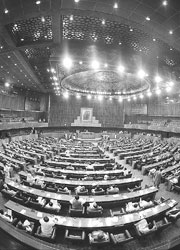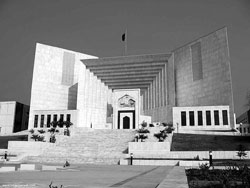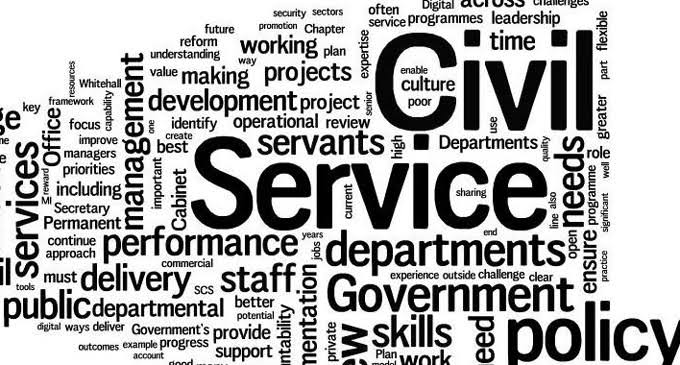Only a meaningful civil service reforms can improve the state capacity to perform better
Pakistan’s inability to provide security and justice to its citizens; and deliver basic services is a common theme in our political discourse. Political parties, which are in power, make tall claims of doing this and that but in effect their reliance on a state apparatus which is unable to deliver is a known reality. During the last four years, other than taking very cosmetic steps the way our executive branch of the state is organised has remained unchanged.
Whereas a beginning has been made to shift the power from centre to provinces, the provincial administrations continue to work according to structures that were established nearly 160 years ago. Much has been said and written about a long pending civil service reform but nothing has been achieved except the partial reform in the 1970s.

Pakistan is a populous country now and its problems have grown manifold in the past few decades. Yet the inability of the state to respond to the challenges is spectacular. Also, the word ‘reform’ is a joke now for every time it is mentioned the transformationists make fun of it and the agents of the status quo start citing the failed experiments of the past.
What impedes reform then? Working on various projects with federal and provincial government departments and agencies teaches you that structures are overwhelming when it comes to arguing for even minor changes.
Without a holistic policy framework and political will ‘change’ as most donor assisted projects argue is not easy to achieve. We also hear of the clichéd, oft-cited lack of ‘political will’ when it comes to reform. The Pakistani parliament by enacting 18th, 19th and 20th amendments has shown the way ahead. A political consensus on reform is vital for it to be implementable and meaningful.
The consensus in the Pakistani context would imply compacts between the political and the technocratic, among federal and provincial, and more often than not, between civil and military branches of the state.
Of late, the reformist solutions require some sort of judicial endorsement as well. What is clear is that there are no short-cut solutions and no alternatives to political engagement in the reform process. The failures of Ayub and Musharraf led reforms to the civil service are cases worth citing here.
In both cases, the military regimes tried to devolve power to an extent and tried to contain democracy at national levels leading to absence of political consensus. Musharraf’s local government system vanished within months of his departure from the scene.
Given these constraints, there is an urgent need for the political parties to reflect on this serious dilemma. The way federal and provincial secretariats function is antiquated and inefficient. The Police is being managed through a nineteenth century law and the court procedures also follow at least a century old set of rules. Assuming that Pakistani democracy is now an irreversible reality, how will the political parties deliver the goods without thinking of such reforms?
Even the Pakistan Tehreek-e-Insaaf which has captured the imagination of young men and women who are disappointed with the ‘old’ players, has regurgitated lots of rhetoric and promises made earlier with little policy input on a wider restructuring of the government.
At the same time, the media which uses a simplistic and populist line of commentary fails to generate the kind of debates we need. For instance, what sort of court systems will work better? What is the extent of local government functions and their revenue generating power? Should we retain huge secretariats and send more officials to the districts and tehsils? These issues remain unresolved despite the 65 years of ‘nationhood’ where colonial status quo has ruled.

After the devolution of certain mandates and functions in 2011, it was expected that the provincial governments would rearrange their administrative structures. Little progress has been noted other than one of two provinces. Khyber-Pakhtunkhwa and Punjab provinces have made some changes and formed multiple committees to look into the matter.
This is a classic opportunity for the political parties to set into practice structures that will be facilitative for the democratic process and will help establish more responsive governance.
In the recent years, I was part of a research team, which looked at the resizing of the provincial secretariat in the Punjab province. The key recommendation was that nearly three-dozen departments could be reduced by at least one third by removing duplication and several entities (companies and boards set up by the government) could be streamlined and merged to gain efficiency and achieve better coordination.
Luckily, the Punjab government was embarking on a process of reshaping and it did merge a few departments but the full scope of a restructuring could not be achieved.
The research also recommended that a full-scale justice department was needed to oversee prosecution, issues relating to the provincial judiciary, and legislation. Similarly, a land management department or authority was required which could replace the colonial land administration and modernize its functions. Several such studies and recommendations are available should the political parties need to consult them.
Across Pakistan, the Rules of Business, which drive government operations, are obsolete or ineffective. They have to be realigned as well. The devolution of powers to the provinces and future local governments will not work if such structural changes are not made and the top-heavy provincial administrations are not shaken up.
In many provinces for instance, social protection functions are dispersed between zakat, labour, education and social welfare departments. Once the Benazir Income Support Programme and Bait-ul-Maal are added to this list it becomes even more complex. In this situation it is difficult to track who receives what from the government and whether there is minimum level of duplication.

At the central level, it is unclear if the federation will reform the huge structures of federal civil services and devolve management to the provinces. Without this particular step, full devolution of powers will not be achieved. The provinces manage their own cadres, which have historically felt subservient to the federal and more powerful civil service cadres. There is much to be done if we need to make the public servants more accountable and effective. And there is little progress in this direction.
As I have written earlier, obviously with little impact, the proposals culled by the commission headed by Dr Ishrat Hussain are the most recent efforts at research. The creation of national and provincial executive services is a feasible and much needed idea.
Opening up senior positions to private sector and other technical experts will also ensure that there is better capacity within the civil service. The well-known complaint of too many generalists in the government can also be handled through such a strategy.
The political parties are gearing for a general election in the next six months or so. They are also working on their manifestoes and this would be a good time if their leaders and policy wonks would look at the earlier reports on civil service reform and make some use of them.
The media must also play its due role. Instead of looking at the sensational failures or gaps in delivery of government services, it might attempt to highlight the structural and organisational issues within the civil service and government operations.
There are long-standing issues of pays and pensions, of government land and diminishing internal accountability. Within the ambit of public services, police and prosecution reform is of immense importance.
All provinces are grappling with insurgencies, worsening law and order and daily reports of under-performance and corruption. As people’s representatives, it is imperative that politicians take charge of this situation instead of another messiah proposing a technocratic reform-model, thus undoing all that has been achieved in the past few years.
Without a meaningful civil service reform, state capacity cannot improve in the dire circumstances that we face today.
Published in The News, September 2012.



